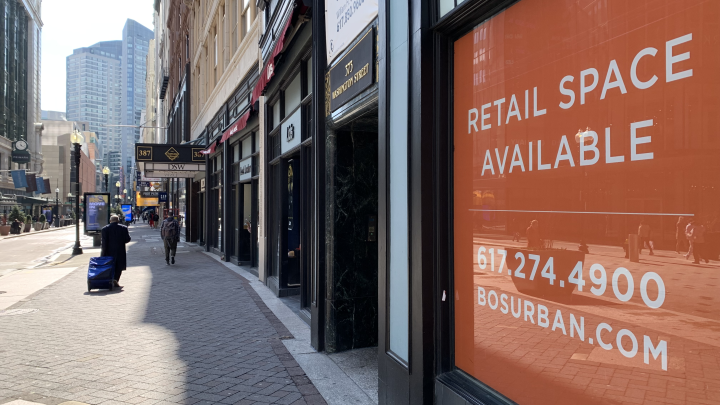
Restaurant, retail recoveries diverge in downtown Boston

Lunchtime at High Street Place Food Hall in downtown Boston is often busy these days, with a mix of office workers, construction workers and tourists eating pizza, sushi and burgers.
The upscale food court was originally designed primarily for the office worker breakfast and lunch crowd and was scheduled to open its doors in late March 2020.
Then, in mid-March, Lauren Johnson, senior marketplace manager at High Street Place, was standing in the big airy glass atrium looking up at a giant video screen, when the news broke that the NBA had suspended its season.
“At that point, we decided to delay a little bit,” Johnson said. “Which we thought would be, you know, a couple of weeks, three weeks.”
Instead, it ended up being two years. And when it finally did open last spring, it was to a very different downtown, one with fewer office workers.
So, the High Street managers been experimenting with different ways to make it more than just a place to come grab breakfast or lunch, to keep people downtown after work, and lure tourists and residents from other parts of the city too.
“We have live music Thursday, Friday, Saturday nights,” Johnson said. “We have our entertainment license, so there’ll be some dancing in here soon.”
A growing number of places to eat, drink and socialize are popping up in this part of the city.
“We have more bars and restaurants in downtown Boston now today than we did before the pandemic. Probably 10% more and growing,” said Michael Nichols, president of the Downtown Boston Business Improvement District.

Retail, meanwhile, has gone in the other direction. There are about twice as many retail vacancies downtown now as there were before the COVID-19 pandemic, according to Nichols. And though new stores are opening, old ones continue to close. It’s a notable shift.
“For the last several generations in this area of Boston, our services, our retail offerings have been responding to the needs of the office worker,” Nichols said. “And so we’ve had tailors and shoe shine and clothing and fast-casual lunchtime options.”
But now, with many office workers only coming in a few days a week, if at all, “we’re trying to kind of reorient the downtown to focus on a broader set of stakeholders: students, theater visitors, tourists,” he said. “And those are audiences that I think are consuming space, and our environment in downtown broadly, differently than an office worker would.”
These days, people seem to be coming downtown looking more for experiences and places to eat, drink and gather than anything else.
“Retail, I think, still hasn’t hit its stride in who it wants to appeal to in a central business district,” Nichols said. “Whereas I think bars and restaurants have sort of adapted very quickly to their new consumer.”
In Downtown Crossing, a neighborhood that’s long been a retail hub for big chains like Macy’s and Forever 21, there’s now one block that Nichols has dubbed restaurant row, “where we had just probably three or four bars and restaurants before the pandemic, we’re up to 10 now.”
Among the newcomers: a brew pub, a breakfast place and a cocktail lounge called The Wig Shop, which Babak Bina just opened in September.
Bina also owns the two restaurants right next door — one casual, one more upscale — and he’d been dreaming of buying The Wig Shop and connecting the three spaces for years.
By early 2022, it felt like the moment had come — like Boston, as a city,. was finally starting to emerge from the pandemic and like the right time to take a risk. Even though things are still slow at his existing restaurants during the day, and even though staffing is still hard, and even though everything still feels precarious and uncertain.
“I think that oftentimes, people are looking for the good times to do things,” Bina said. “But sometimes being able to buy in the low market is a smart way of doing it.”
And he sees a lot of other restaurant owners in Boston who also made it through the pandemic doing the same thing: expanding and betting on the city’s recovery.
There’s a lot happening in the world. Through it all, Marketplace is here for you.
You rely on Marketplace to break down the world’s events and tell you how it affects you in a fact-based, approachable way. We rely on your financial support to keep making that possible.
Your donation today powers the independent journalism that you rely on. For just $5/month, you can help sustain Marketplace so we can keep reporting on the things that matter to you.











